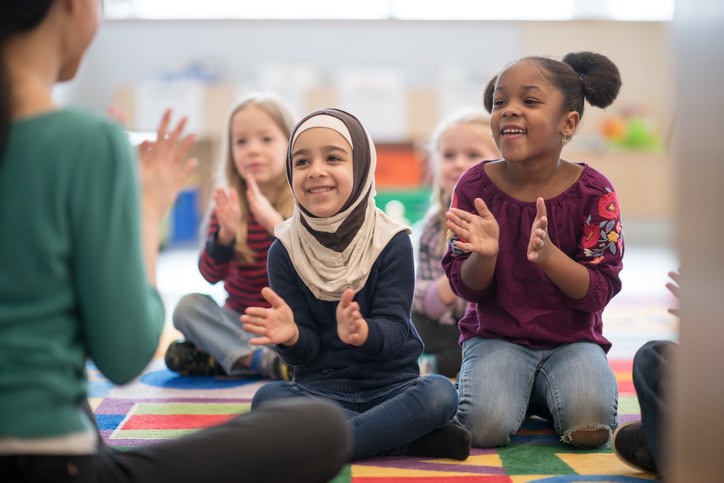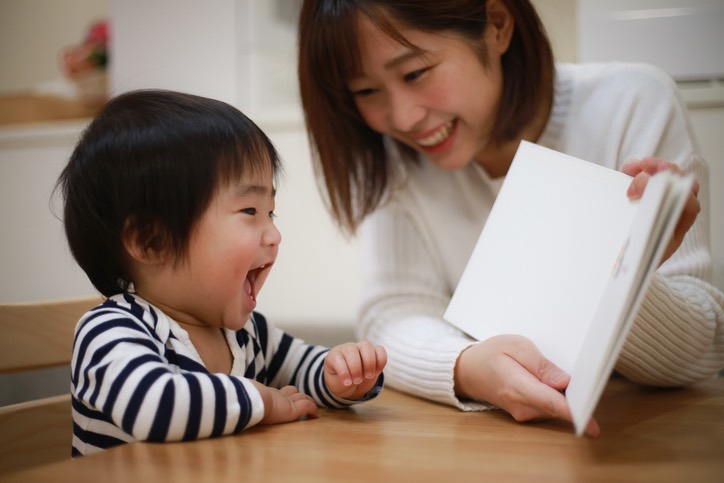Is Your Child Ready for Preschool?

If you are a parent of a young child, you have likely heard the terms ‘preschool readiness’ or ‘school readiness’ a lot. But what does it mean, practically, to be ‘ready’ for preschool? As someone who taught preschool and Pre-K for fourteen years and has been in the education field for sixteen years, I personally think there is very little that’s needed in order to be ready for preschool.
The preschool environment is an opportunity for socialization beyond play dates and to build on the developmental skills that young children begin learning at home. It’s also an important step in preparing for kindergarten - when your child attends preschool, they will be spending more time away from home and slowly get used to the idea of spending less hours in the day with mom or dad.
All childcare and early childhood learning centers have individual rules and requirements for enrollment. For example, some smaller programs may insist your child be potty-trained before they attend because they don’t have the extra staff to help with accidents and clean-ups. In addition, private and prestigious preschools may have entrance exams, which, quite frankly, I believe is absurd. A preschool setting should be played-based, relaxed, and loving. But either way, some of these requirements mean that the decision on whether or not your child is ready for preschool may, to an extent, be made for you.
When looking at preschool programs, consider your child’s temperament, the tuition costs, distance from your home or office, and the school's overall philosophy. These are all important factors to consider when choosing a preschool.
Each child and family will have different needs, but here are some basic tips to help you decide if your little one is ready for school!
When Should My Child Start Preschool?

If you’ve been a stay-at-home parent, or your child has stayed home with a nanny or caregiver and you are now looking to send your child to preschool, the average age for doing so is around 3 or 4. Most early childhood programs consider preschool ages 2 ½ - 3 and pre-K or pre-kindergarten 4 - 5 ½.
Young Preschool
If you have the financial means, I recommend starting your child in a part-time program between two and three years old. Daycare and childcare programs can assist you with potty training and spending short periods of time away from home, and can also help everyone deal with separation anxiety.
Look for half-day programs, for example, ones that run from 9am until 12pm, as opposed to every other day programs.
Traditional Preschool
Traditional preschool is typically for children who are at least 3 years of age and may be offered part-time or full-time. Depending on where you live, it may even be available through public school. For some children, starting part-time is best if this is their first time attending a child development center.
A typical full day of preschool will look something like this:
8:45 am-9:05 am - Arrival and greetings
9:05 am-9:10 am - Good morning circle time
9:15 am-10:15 am - Free play time
10:15 am-10:20 am - Clean up
10:20 am-10:25 am - Hand-washing
10:30 am-10:50 am - Morning snack
10:50 am-11:00 am - Scheduled bathroom break
11:05 am-11:30 am - Outdoor play
11:35 am-11:40 am - Hand-washing
11:45 am-12:00 pm - Storytime
12:00 pm-12:05 pm - Hand-washing
12:05 pm-12:45 pm - Lunch
12:45 pm-1:00 pm - Scheduled bathroom break and nap preparation
1:00 pm-3:00 pm - Nap time
3:00 pm-3:15 pm Scheduled bathroom break/clean-up from nap time/’table toys’ play time
3:15 pm-3:20 pm - Hand-washing
3:20 pm-3:40 pm - Afternoon snack
3:45 pm-4:15 pm Music and movement
4:15 pm-4:30 pm Goodbye circle and pick-up
That may seem like a lot - but children work best when they have a predictable schedule. Preschool teachers and settings that schedule time into the day for things like hand-washing and clean-up realize those transitions are just as crucial to the day as play time and meal time. Understanding this sort of timetable can help you determine whether or not your child is ready for this busy preschool schedule.
When visiting classrooms, look for a posted schedule; however, remember that even the most organized teachers will experience unexpected events throughout the day and must be flexible to slight changes.
What If My Child Isn't Potty Trained?
This is an ongoing debate in the parenting and preschool world, but potty training, like all other skills, is a developmental milestone your child must be psychologically and physically ready to attain. Some kids will potty train in a day; others will take weeks, months, and, yes, even years.
Pushing or forcing a child to use the potty does way more damage than going at their pace and looking for signs of readiness, even if it takes longer and makes you want to pull your hair out. So don’t force your child into potting training if they aren’t ready just so that a certain preschool will accept them. While there are preschools that will require your child to be fully potty trained in order for them to attend, you will find preschools that also happily accept children at all stages of the potty training process.
How Do I Know If My Child Is Ready?

Most children find the prospect of starting school fun and exciting. And even if your child is on the fence about attending preschool, the more you talk it up and act excited, the more they will become interested.
The good news is that your child doesn’t have to ‘know’ anything to start preschool. Letters, colors, and numbers will come as they play, learn, and grow. In fact, most kindergarten teachers will tell you that they’re not concerned with your child knowing all their letters as long as they can spell their name and hold a pencil.
Additionally, most children naturally pick up things like letters, shapes, and colors through everyday experiences they are engaged in at home.
Things you can do that will help prepare your child for preschool include:
- Teaching them to recognize their name in print (start with all caps)
- Playing games with colors, numbers, and counting (Candy Land is great!)
- Using environmental print like store signs, menus, and grocery items to point out letters and shapes
- Encouraging them to get dressed themselves, including doing up their own zippers and buttons
- Working on proper hand-washing techniques (teachers will love you for it!)
- Talking to them about their day by asking open-ended questions to expand their vocabulary
- Signing them up for a music or sports class to build their social skills.
Lastly, if you don’t regularly spend time away from your child, make a point to do so before their first day. Hire a babysitter and head out for an hour or two a few times. It will help you and your child lessen the chances of experiencing separation anxiety when they eventually start preschool.
What If My Child Is Neurodivergent or Has a Known Delay?
If a pediatrician or early childhood specialist has diagnosed your child with a congenital disability, neurodivergence (autism, ADHD, sensory processing, down syndrome, etc.), or physical delay, in most cases, your child can still attend a traditional preschool program.
Private preschools and childcare centers must adhere to the regulations outlined in the ADA (Americans with Disabilities Act), which means they must make reasonable accommodations before saying no to a child attending their program.
More and more programs are becoming adaptive and inclusive. For example, my children attended a summer camp this year for kids between ages 6-18 who were all differently abled. It can’t hurt to ask and to see what options are available. You may be surprised to find that a program already has several children with varying abilities enrolled.
Final Thoughts
In most cases, it is better to push a child forward who may be on the fence than to delay enrollment because of potential anxiety or separation fears. However, you know your child best, and only you can ultimately decide when they should start preschool.
The pandemic hemmed the ability of a lot of young children to socialize with peers. The good news is that children, especially very young ones, are resilient. However, if you feel your child needs more experience interacting socially, look for opportunities for them to engage with other kids. Regular trips to the playground, dance classes, ‘mommy-me’ groups or playdates are all great options. Many local and community-run summer camps have programs for children as young as 4 years old and may offer part-time options too.
If you’re still having doubts, visit local programs and child care centers, join discussion groups online, or seek the advice of friends and family who have gone down this road before you. After all, it takes a village to raise a child.

